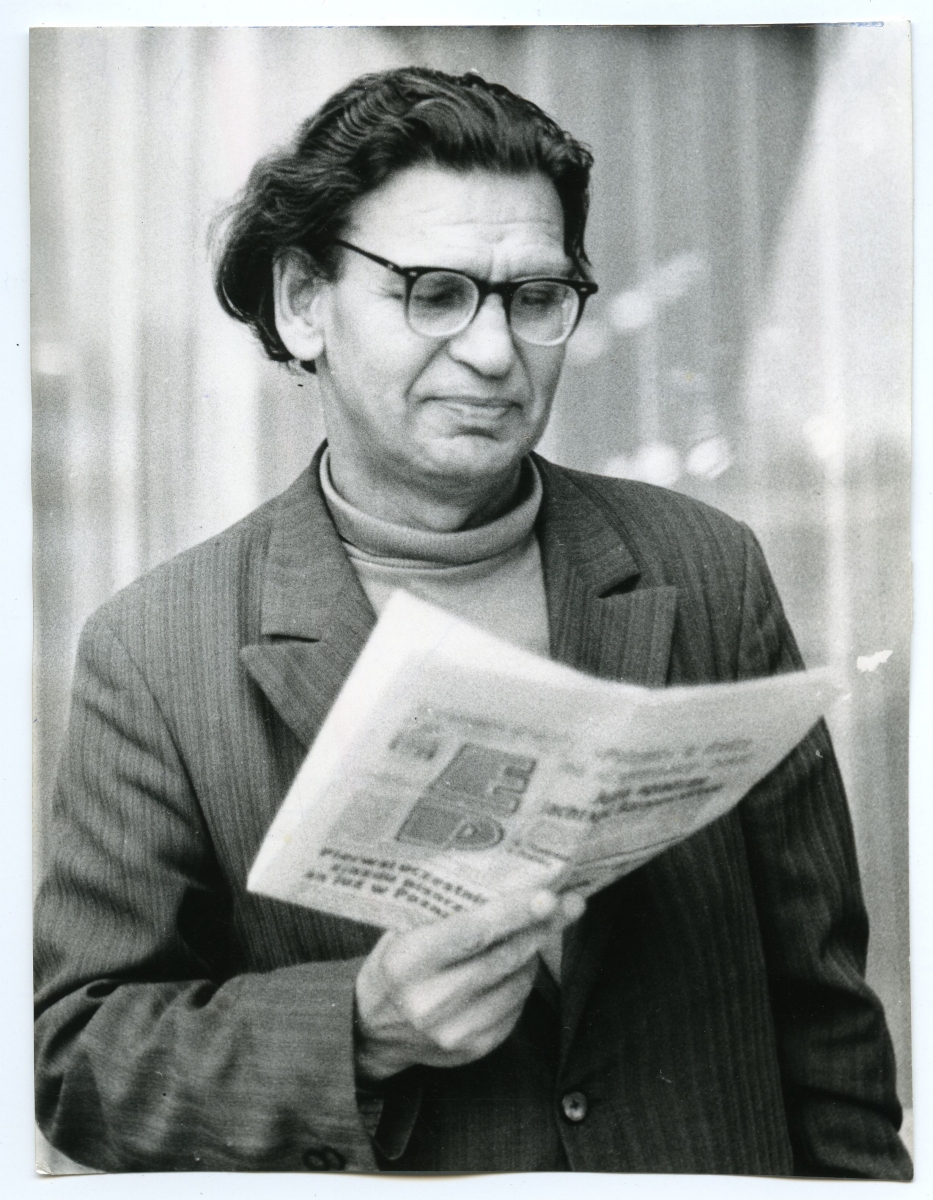
Boris Kabur
Boris Kabur (15. IX 1917 – 28. I 2002) was an Estonian writer and translator, whose literary works mostly deal with ethical and philosophical science problems in the science fiction genre.
He was born to a working class family, his father was Mordovian, his grandfather was a shaman in Mordovia. From 1925–1931, he studied in Tallinn 5th primary school and in 1936, he graduated from Tallinn Secondary School of Business for Boys. In 1941, he graduated from the Faculty of Mathematics and Science of the University of Tartu with a Master’s degree in physics and continued his studies in medicine. Joining the student society Veljesto furthered his interest in the humanities. From 1942–1945, he worked as an assistant in the Radiology Department of the University of Tartu. From 1945–1946, he was imprisoned. From 1946–1947, he worked at the Russian Research Institute of Fisheries and Oceanography (VNIRO) in Moscow. From 1947–1954, he was imprisoned in a prison camp in Siberia. As a testament to his inventiveness, he co-constructed the handheld chainsaw Druzhba while working in the forestry department at the prison camp. Druzhba later became an iconic and widely used tool all over Soviet Union. In 1954, Kabur made his way back to Estonia and became a freelance writer. In 1966, he joined the Estonian Writer’s Union. He was selected for the position of honorary member of the Estonian Academic Oriental Society for being a merited translator of Oriental literature. From 1970, he was a member of the adventure and science fiction writing council of the Union of Soviet Writers. In 1973, he won the science fiction main prize of socialist countries in Poznań with his young adult short story Kosmose rannavetes (‘In the Coastal Waters of Space’). In the last decades of his life, he lived in Peedu, near Elva.
His cybernetic children’s plays Rops (staged in 1964) and Rops aitab kõiki (‘Rops Helps Everyone’, staged in 1965, both plays published in 1967) join the scientific zeitgeist of the time by using fairytale devices to explain to children the truths of modern science, i.e. cybernetics. Cyber boy Rops is an everyday life character who resembles humans in almost every sense and humorously embodies the artificial intelligence ideal of scientific and technological progress. By contemplating the problem of the conscience and most importantly, of good and evil, and through portraying the metaphorical relationship between man and machine, Kabur explores the ethical side of technocracy of the day. His plays criticize the bureaucratic Soviet school and education system, which favored robotic behavior, rigid thinking and putting the collective first. His plays were repeatedly staged in the Soviet Union, Eastern Europe and Finland, but also by Estonian drama societies in the US and Australia.
His optimistic story Kosmose rannavetes (‘In the Coastal Waters of Space’) is pure science fiction, a so-called planetary romance that takes place on 24th century Earth and the planetoid Hermes. The main characters are three young and daring scientists, who expose a conspiracy by a power hungry space scientist and eliminate the lurking danger at the secret spaceport. The story creates an idealized image of future humans and an exaggerated vision of scientific and technological progress. The adventuristic and exultantly idealistic narrative explores the role of a scientist and the strength of the collective in society.
The psychological sci-fi drama Antivalgus (‘Anti-light’, staged in 1968) that remains in the manuscript stage, describes the intrigues in scientist circles that arise from ethical and philosophical differences. The play toys with quantum physics problems and explores the role and responsibilities of scientists in society.
From 1941, in addition to fiction, Kabur also produced many translations. Most notably, he translated poetry by W. Whitman and E. L. Masters, the epic Laul Haiavatast (‘The Song of Hiawatha’ by H. W. Longfellow) that features Native American characters, Frankenstein by M. Shelley, and other works by V. Rasputin, N. Roerich, N. Wiener and many others. He translated into Estonian other epics as well, for example the Sumerian epic Gilgamesh and the Armenian Sassuuni Davith (‘David of Sassoun’) and published many literary and scientific articles.
A. O. (Translated by A. S.)
Books in Estonian
Short stories
Kosmose rannavetes. Tallinn: Eesti Raamat, 1966, 144 lk.
Sassuuni sõgedad: lugusid armeenia muistsetest kangelastest. Jutustanud Boris Kabur. Redigeerinud ja eessõna: Ain Kaalep; illustreerinud K. Smbatjan. Tallinn: Eesti Raamat, 1979, 250 lk.
Gilgameš: Veeuputusaegseid lugusid Gilgameši eepose järgi. Tallinn: Eesti Raamat, 1987, 60 lk.
Haiavata lood. Tallinn: Eesti Raamat, 1990, 143 lk. [H. W. Longfellow indiaani mütoloogial põhineva kunsteepose ümberjutustus.]
Plays
Rops. Rops aitab kõiki. Tallinn: Eesti Raamat, 1967, 80 lk. [Sari ‘Kooli näitelava’, 11. kd.]



